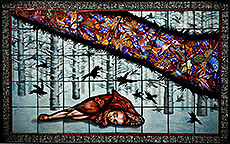Rebekah Curry
The Flowers Appear on the Earth
That month, for what seemed forty years or so,
he sat alone and brooded on his wrongs;
meanwhile, the grass remembered how to grow
and winds from other climates rose like songs.
He asked the hawthorn and the lazy sun
why he remained unlucky; neither said.
The rabbits manifested on the lawn.
He heard ironic echoes in his head.
The leaves were full and rustling as he thought
of days that never were. Atop that tree,
a wood thrush lilted. All his heart was caught
inside the dusty house of memory,
which rendered him incapable to move
into another air, a better love.
Return
One morning, he received a telegram
that stated: THOSE WHO SOUGHT YOUR LIFE ARE DEAD.
Unpacked from a dilapidated tram,
he found all was exactly as it said.
The fountain bubbled in the city square;
the tyrant's florid monument was razed;
throughout the liberation's literature,
he saw his own name mentioned; he was praised.
The minister who offered him a post
assured him of his value, and he spent
his days in work that seemed to be almost
worthwhile. Now, at one with government,
he dreamed of that inevitable flight.
A quickened heartbeat woke him in the night.
On Love as the Answer
If love could solve it, nothing would be solved.
Decay, estrangement, cancer, suicide,
and all the human pains that life's involved
us in--if love and nothing else defied
their ravages, we'd stand in ruins now.
Its cure would be too small to ease the wound
the world makes daily, or to ever slow
infection's growth. We waken to the sound
of brave collapse, and every night we hear
an echo in the dark, forgetting what
it means. But if we listen, year on year
the measured breakdown can remind us that
still nature runs its course, with this result:
what's worst is easy. Love is difficult.
Sonnetsomatic
A complex liability, too weak
to fortify itself, too hard to yield--
this small and unexemplary physique.
So many dead philosophers appealed
to statements on the insignificance
of bodies when the metaphysical
alone exists. But let the pain advance,
let fever rise, and they've forgotten all
their rationales. I carry such a weight
of blood and bone, its unimportant cares
that any human knows to tolerate:
lost sleep, bad eyesight. Aren't we all the heirs
to Adam's flesh? We act it as we must.
I learn each day to retrogress to dust.
|
|
 |
 |
|
|
 |
>We are pleased to announce that Anne-Marie Thompson is the recipient of the Mezzo Cammin scholarship at the West Chester University Poetry Conference and Wendy Sloan is the recipient of The Mezzo Cammin Women Poets Timeline Project scholarship.
|
|
|
 |
|
|
|
 |
Judith Schaecter: I found the beauty of stained glass to be the perfect counterpoint to ugly and difficult subjects. Although the figures I work with are supposed to be ordinary people doing ordinary things, I see them as having much in common with the old medieval windows of saints and martyrs. They seem to be caught in a transitional moment when despair becomes hope or darkness becomes inspiration. They seem poised between the threshold of everyday reality and epiphany, caught between tragedy and comedy.
My work is centered on the idea of transforming the wretched into the beautiful--say, unspeakable grief, unbearable sentimentality or nerve wracking ambivalence, and representing it in such a way that it is inviting and safe to contemplate and captivating to look at. I am at one with those who believe art is a way of feeling ones feelings in a deeper, more poignant way.
I would describe my process as derived almost entirely from traditional techniques in use for centuries. The imagery is predominantly engraved into layers of glass; only the black and yellow are painted and fired on in a kiln. The pieces are soldered together in a copperfoil and lead matrix.
|
|
|
|
|
|
 |
|
 |
|
|
|
|
